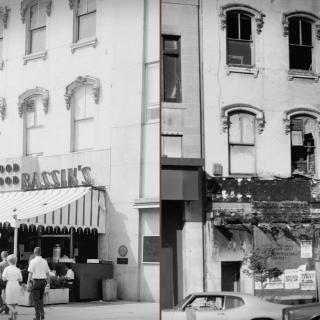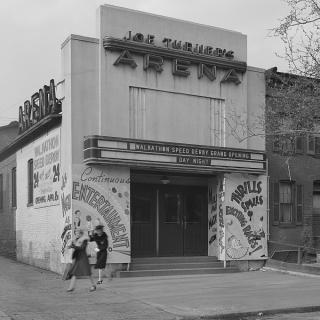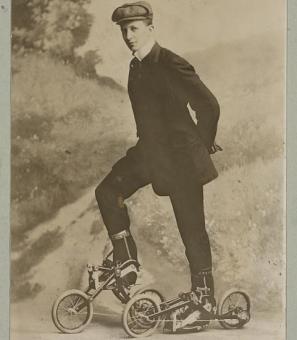The Golden Age of D.C. Sportscasters
It was Super Bowl XVII in Pasadena, California. The Washington Redskins were set to take on the Miami Dolphins in a rematch from their meeting in Super Bowl VII a decade before. Outside of a Pasadena hotel designated for the media, a group of sixteen men jovially sang and hugged each other. At their center, a recognizable voice could be heard over the merriment. “Ladies and gentlemen this is the class of ’83. These sixteen men ran up the highest hotel bill in the history of Western civilization.”
The voice belonged to Glenn Brenner, Washington’s comedic evening sports broadcaster from Channel 9 news, celebrating with his crew. The men did indeed tally up a massive hotel bill, yet there was one detail that Brenner left out of his speech. He had charged the bill to George Michael’s room, his rival sportscaster at Channel 4.[1]
The 1980s was a golden age of local sports broadcasting in the Washington, D.C. area. Four stations vied for control over a competitive news and sports market. At the center of this battle stood two of the finest sportscasters that Washington has ever known, Glenn Brenner and George Michael. Both men were radically different in their approaches; one used humor and natural wit to win audiences, another revolutionized the use of videotape highlights. But both were very successful… and competitive.
Having dinner w/ @duvallSpx and he pulled out this gem from Super Bowl XXII #dclegends #georgebuckbrennerherzog pic.twitter.com/Z6TzZ1G7
— Dan Hellie (@DanHellie) February 19, 2013
Though he received numerous offers for basketball scholarships out of high school, Glenn Brenner’s heart was in baseball. He spent six years in the minor leagues of the New York Mets and the Philadelphia Phillies organizations, working his way up to AA. Unfortunately for Brenner, his pitching was limited to a good fastball but not much control. Facing a choice of playing in Mexico, Brenner moved on to work in radio and eventually in television.[2]
Brenner began his career as a sportscaster in Huntington, West Virginia. Within a year, he moved to Philadelphia’s WKYW-TV, where his jovial pranks and humor failed to ingratiate him with station management.
Luckily for viewers in the Washington area, Brenner was picked up by WTOP-TV[3] Channel 9 in 1977 to be the weekend sportscaster. Within a few months, he was manning the desk on weeknights as Channel 9’s lead sportscaster.[4]
Besides his witty delivery of scores and highlights, Brenner created a number of weekly segments and skits such as the “Weenie of the Week,” where he would single out a member of the sports community who deserved a bit a public shaming. Viewers couldn’t help but laugh at the light-hearted and humorous bits.
During each NFL season, Brenner would do a skit called the “Mystery Prognosticator,” where he would conduct a football pool with a local or national celebrity. Prognosticators ranged from media celebrities such as Larry King, Dan Rather, and William Shatner, to wackier guests like an elephant at the National Zoo. One of Brenner’s most famous prognosticators was Sister Marie Louise, a local nun who picked games with such accuracy that she became a regular on Channel 9. Her success was such a story that it was covered in People magazine.[5]
Brenner’s personality and antics ingratiated him with audiences and he won an Emmy award as well as several AP awards for excellence. However, it wasn’t long before his reign at the top of the hill would be challenged.
George Michael spent several years in the Midwest as a popular radio disk jockey. He worked for a brief stint in New York with Warner Wolf—another D.C. broadcasting legend—before landing a job at Washington’s WRC-TV Channel 4 in 1980. At the time, Channel 4 was dead last in ratings, something Michael hoped to change quickly.
Early on it was a struggle for the excitable and sometimes loud sportscaster. Michael’s delivery was thought by many to be abrasive, and Michael remarked about those first broadcasts, “We got 52 phone calls and 48 of them were screaming ‘Get that guy off of the air.’” [6] He soon made a name for himself with his innovative use of technology and video highlights. Michael would spend hours each day with a dedicated team combing through video highlights from various sports across the country to use in rapid-fire fashion on his nightly segments. He also produced a syndicated, Emmy-winning Sunday evening show called “George Michael’s Sports Machine.” It was here that Michael gathered clips and highlights from Sunday’s NFL games along with clips from baseball, basketball, and even wackier clips from rodeo or professional wrestling. He featured highlights and interviews from sports such as NASCAR before stock car racing became a popular sport outside of the south. If there was something that wasn’t covered on the “Sports Machine,” viewers could call a special hotline to get the scores and stats from any game of the day. The show not only aired in the Washington area, but across the country on NBC’s two-hundred affiliates.[7]
Today, this fast shot of sports clips and highlights seems trivial and outdated. We’ve been spoiled by 24-hour sports coverage from juggernauts like ESPN and instant access to clips and scores on our smartphones and tablets. In a decade without these modern luxuries, George Michael’s approach was innovative and trend setting, and carried Channel 4’s ratings to a neck-and-neck tie with Channel 9.
Brenner and Michael would trade ratings back and forth for over a decade, and both men contributed to a high water mark of local sports coverage in Washington. Between the two of them and well respected competitors Frank Herzog at WJLA and Steve Buckhantz at WTTG Channel 5, sports coverage on D.C. airwaves during the late 1980s and early 1990s was in very good hands.[8] Check out the clip below of the four sportcasters with D.C. Mayor Sharon Pratt Kelly in 1991 giving their case for bringing baseball back to Washington.
Brenner and Michael, in particular, created a new culture for the sports broadcaster, that of the performer. What made them area icons was their success in bringing sports reporting to the casual viewer. Brenner said it best:
Seventy-five percent of the people who watch the news are not interested in sports. Every news director I’ve ever spoken to tells me this. Three-quarters of my audience are already bored with what I have to say before I get on camera. I’ve got to try and keep them from going to the restroom or making a bologna sandwich or whatever they do when sports comes on. So I use humor and oddities in sports.[9]
Even a sports-centric broadcaster like George Michael used highlights from professional wrestling or rodeo to attract a wide audience to his sports broadcasts. This appeal to the general audience made both men local sports legends.
The competitive atmosphere around Brenner and Michael led to pranks of errant hotel bills, but it could also be ugly and cutthroat as well. In 1987, Michael accused Brenner of “immoral, unprofessional, and illegal” behavior when Brenner aired footage of Redskins coach Joe Gibbs walking off of an interview with George Michael. The footage was never meant to be aired to the public.[10] Despite these ugly occurrences, Michael admitted that he and Brenner had “a wonderful, competitive relationship that most folks would never understand.”[11]
Sadly, the golden age of Washington sports coverage ended tragically in the winter of 1991 and 1992. After completing his second Marine Corp marathon, Glenn Brenner was hospitalized with what was called a “vascular disorder.” Within a span of three weeks, Brenner’s condition worsened. In January of 1992, Brenner was diagnosed with an inoperable brain tumor. The Washington Redskins dedicated their NFC Championship game against the Detroit Lions to Brenner, with coach Joe Gibbs himself delivering the game ball that night to Brenner’s hospital room. Brenner would pass away on January 14th, 1992 at the age of 44. The city mourned the passing of a broadcasting legend taken from the world far too early.[12] It’s fitting that one of the best tributes to Glenn Brenner came from his greatest professional rival, George Michael, in a tear-filled tribute to Brenner on Channel 4's 6pm broadcast:
The measure of any man’s wealth can be determined by how much he is loved. And I assure you that there is no wealthier man going to Heaven than Glenn Brenner.[13]
After Brenner’s death, George Michael would go on to take his place as the leading sports broadcaster in Washington, D.C. for over two decades until his retirement in 2006.
It’s hard to say if we as sports fans will ever see a broadcasting duo like George Michael and Glenn Brenner again. In a world that is rich with ways to gather sports information, it’s hard not to feel a little poorer because of it.
Footnotes
- ^ WUSA 9 News, air date January 15th, 1992, via YouTube timestamp 01:22:54. You can view the relevant clip at the top of the article or to view the entire broadcast visit the link here at https://www.youtube.com/watch?v=6n8CQ59lh0k
- ^ Martie Zad, “Glenn Brenner: Fun, Puns, and Simple Math,” The Washington Post, January 26th, 1986, 10.
- ^ Channel 9 changed its call letters several times during the time period written about in this article. WTOP-TV was changed to WDVM-TV in 1978 and to WUSA (its current name) in 1986. For ease, this article will refer to the station simply as Channel 9.
- ^ “Brenner Replaces Wagener at WTOP,” The Washington Post, February 23rd, 1977, 86.
- ^ Leonard Shapiro, “Glenn Brenner Succumbs to Brain Tumor at 44,” The Washington Post, January 15th, 1992, A1.
- ^ Gary Pomerantz, “Barnum With a Mike,” The Washington Post, May 30th, 1984, D1.
- ^ Norman Chad, “Michael’s ‘Machine,’” The Washington Post, November 30th, 1984, D2.
- ^ Norman Chad, “Michael Gets Most—and Least—Out of Poll,” The Washington Post, June 12th, 1987, B2. Herzog worked with Brenner for years at Channel 9 before taking the job at Channel 7. He also spent over three decades as the beloved voice of the Washington Redskins radio broadcasts with Sonny Jurgenson and Sam Huff. Four-time Emmy winner Buckhantz has been the television play-by-play man for the Washington Wizards since 1998.
- ^ Martie Zad, “Glenn Brenner,” 7.
- ^ Norman Chad, “Airing of Gibbs Tape Sparks TV Tempest,” The Washington Post, August 1st, 1987, 74.
- ^ WUSA 9 News, January 15th, 1992.
- ^ Leonard Shapiro, “Glenn Brenner Succumbs,” A16.
- ^ WUSA 9 News, January 15th, 1992.



![Ben's Chili Bowl, 1980 (Photo Source: Library of Congress) Highsmith, Carol M, photographer. Ben's Chili Bowl, Washington, D.C. United States Washington D.C, None. [Between 1980 and 2006] Photograph. Retrieved from the Library of Congress, https://www.loc.gov/item/2011635251/. (Accessed December 04, 2017.) Ben's Chili Bowl, 1980 (Photo Source: Library of Congress) Highsmith, Carol M, photographer. Ben's Chili Bowl, Washington, D.C. United States Washington D.C, None. [Between 1980 and 2006] Photograph. Retrieved from the Library of Congress, https://www.loc.gov/item/2011635251/. (Accessed December 04, 2017.)](/sites/default/files/styles/crop_320x320/public/17058v.jpg?itok=egZM-IR9)

![Sketch of the mythical fuan by Pearson Scott Foresman. [Source: Wikipedia]](/sites/default/files/styles/crop_320x320/public/2023-10/Goatman_Wikipedia_Faun_2_%28PSF%29.png?h=64a074ff&itok=C9Qh-PE1)












